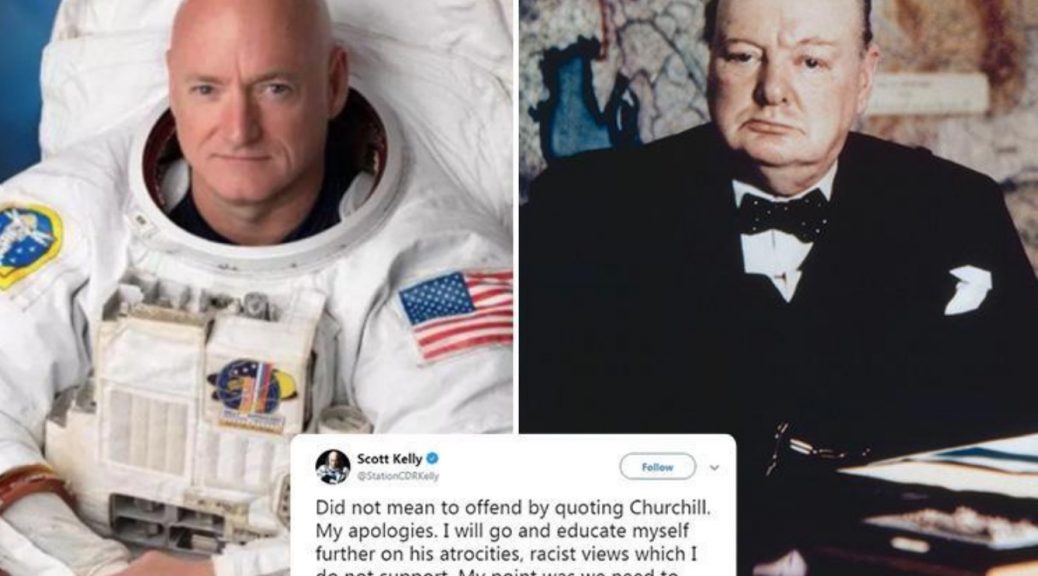
Current Churchill Contentions: “The Invasion of the Idiots”
“Current Contentions” was delivered at Hillsdale College’s Center for Constructive Alternatives seminar on “Churchill and the Movies,” 27 March 2019. For the video, please click here.
Edited transcript: The original speech included certain subjects covered earlier and elsewhere. These are summarized below, and provided with links to the original texts. The video, which is unabridged, includes questions and answers with the audience.
Churchill’s World of 1932
Eighty-seven years ago, Churchill was here in Michigan, in Detroit, Grand Rapids and Ann Arbor, on a U.S. lecture tour. East, west, north, and south he rode the rails, “living all day on my back in a railway compartment and addressing in the evening large audiences.” He concluded, startlingly for someone with his background, that it was the hardest work he’d had in his life.
In Detroit on February 5th, Hindu demonstrators protested his opposition to the Government of India Act. A dozen detectives supplemented his faithful bodyguard, Walter Thompson. Only a few weeks before, he’d been knocked down and nearly killed by a car in New York City. His first words on regaining consciousness were, “They almost got me that time, Thompson!” Imagine how that would have changed history.
Though fearless of protestors, Churchill never talked about domestic politics abroad—a practice that today seems almost antique. His 1932 lectures were consistent with a lifelong theme: Anglo-American unity. On March 1st in Ann Arbor, he railed against rash proposals for disarmament in the face of tyrannies: National Socialism and Soviet Socialism, which he compared to the North and South Poles, equally uninhabitable. The English-Speaking Peoples, he said, must unite to combat the world’s miseries. I thank Dick Marsh of Ann Arbor, who is with us today, for these details.
Current Contentions
Alas the noble sentiments that drove Churchill all his life have lately taken backstage to violent contentions, spread by the Internet, particularly social media, and bad movies from The Crown to Viceroy’s House. Not a month passes when he is not accused of something dreadful, from xenophobia and racism to misogyny and war crimes. Farhad Manjoo wrote in The New York Times: “Thanks to the malleability of digital media and the jet fuel of network virality, a digital lie can spread more quickly, and cause more damage, than an analog one.”
Confronting this busy industry is a goal of the Hillsdale College Churchill Project, and our web department, “Truths & Heresies.” Last year the cacophony got so loud that, with one of our contributors, Andrew Roberts, we contemplated a “Rapid-Response Team.” Writing for a major newspaper, we’d answer each flapdoodle as it came. Unfortunately, the only paper interested was Britain’s The Sun. And Andrew and I didn’t think it dignified to publish scholarly rebuttals alongside photos of starlets in string bikinis.
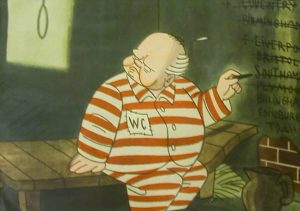
Churchill is attacked more broadly today than in 1940. Back then, the Nazis just called him a drunk. Today’s critics tear him down with a longer litany: his self-centeredness; his liking for gas warfare and carpet bombing; the rude things he said about Hindus or Jews or Muslims; his disdain for anyone other than card-carrying Englishmen.
Policy critiques range from what he did—like defending Antwerp and attacking the Dardanelles—to what he didn’t do—not bombing Auschwitz, not saving Poland at Yalta. That last item is about the only thing the Soviets didn’t accuse him of after the war. See “Assault on Churchill,”
Where do people get these notions?
The Indian historian Zareer Masani offered a crisp explanation in “Churchill a War Criminal? Get Your History Right.” These attacks are “skillfully orchestrated by a few articulate and ambitious individuals, publicity-hungry detractors [who accuse him of having] more blood on his hands than Hitler, Stalin and Mao put together. There was a time when such absurd comparisons would have been dismissed as the ravings of fantasists. But today they attract a Twitter following of gullible millions, happy to swallow the tallest tale if it’s retweeted often enough. Bashing Churchill [has] become a sure-fire way of attracting a mass following, selling potboiler books and reviving flagging political careers.”
No serious historian claims Churchill was infallible. It diminishes him to treat him as superhuman. Accomplished scholars have catalogued his controversies. It is fair to consider them. But not assassins who create imaginary sins by selective editing.
The electronic lynch mob uses Twitter and Facebook and the online tabloids. They remind me of a quip by the late Umberto Eco: “Social media,” he said, “gives legions of idiots the right to speak when they once only spoke at a bar after a glass of wine, without harming the community. Then they were quickly silenced, but now they have the same right to speak as a Nobel Prize winner. It’s the invasion of the idiots.”
Gertrude Bell to Scott Kelly
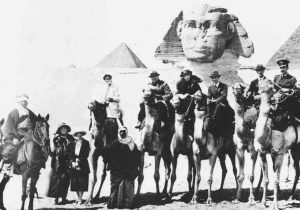
Following Walking with Destiny, Andrew Roberts’ excellent Churchill biography, one reviewer accused him of failing to say Churchill’s actions in the Middle East drove the Arabist Gertrude Bell to suicide. That’s a new one! It was getting so that we actually welcomed new ones.
At the 1921 Cairo Conference, Bell got all she wanted from Churchill: break-up of the Ottoman Empire; Arab states in Iraq and Jordan; her choice of kings on their thrones. She died five years later, but always spoke well of Churchill. Incidentally, it was Bell who talked him out of creating a separate Kurdistan. In retrospect, that would have avoided much trouble. Particularly for the Kurds.
Another critic said Churchill’s biggest gaffe as Chancellor of the Exchequer was to fix the pound at $4.10 in 1929, causing unemployment in the 1930s. In fact the pound, which was worth only $3.66 in 1920, rose to its prewar level of $4.80 by 1929. The devaluation to $4.10 occurred when Britain left the Gold Standard in 1931, over two years after Churchill had left office. A post-World War I recession caused the pound to sink, not the other way round.
* * *
Next, retired U.S. astronaut Scott Kelly innocently tweeted that Churchill was “one of the greatest leaders of modern times.” “Like a meteor storm bombarding a capsule in orbit, furious trolls attacked Kelly on social media,” reported the London Evening Standard. Churchill was a bigot, a mass-murderer and a racist.
Kelly groveled: “Did not mean to offend by quoting Churchill…. “I will go and educate myself further on his racist views which I do not support.” The newspaper mocked his meek collapse: “Of course Churchill was a great leader. It was utterly craven of Scott Kelly to apologize for saying so. The only space the astronaut ought to concentrate on is that between his ears.”
The Crown
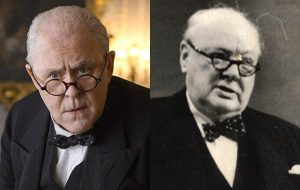
I’m going to describe four current contentions I thought might especially interest you. Since our subject is Churchill and the Movies, let’s start with a really bad film series.
No sooner had I admired the fair, mostly balanced and accurate PBS TV series Churchill’s Secret (on his June 1953 stroke) than I was grumbling through Netflix’s The Crown. It’s about the present Queen’s ascent to the throne, and her first years as monarch.
Is it really so big a deal? Not in itself. But thanks to The Crown we’ll inevitably be told by somebody that Churchill’s stroke was kept from the Queen, that he “forced” her to move to Buckingham Palace, that he painted the same scene repeatedly in his Black Dog of despair. Productions like The Crown suggest that truth and accuracy matter less than style and perception; that reality must bend to fit the creator’s mindset. For details see “The Crown: A Not So Crowning Achievement.”
Lady Castlerosse

We move now to the pastime of attacking Churchill’s character. Last year Britain’s Channel 4 aired a breathless documentary, “Churchill’s Secret Affair.” In the 1930s, they said, Churchill conducted a four-year affair with Doris Delevingne, Lady Castlerosse. The romance took place at the Riviera villa of the American actress Maxine Elliott, where they were occasional guests.
This was a profitable whopper for the tabloid internet. One newspaper even produced a witness, the attractive model Cara Delevingne, Doris’s grand-niece. “It was a tradition in our family,” she explained. “My mother told me.” It took me 2500 words to unravel this one in The American Spectator, and I’m not going to bore you with that. (For details see “Too Easy to be Good: The Churchill Marriage and Lady Castlerosse.”)
The Bengal Famine, 1943
Most popular by far among drive-by ambushes is the 1943-44 famine in Bengal, India. The most comments we get on it are from Indians, which is understandable. The Bengal food shortage was the greatest humanitarian crisis in India’s history. Up to three million Bengalis died. Proportionally, think 16 million Americans.
Gary Oldman’s Oscar for the Churchill film Darkest Hour was protested in the Washington Post by the Indian politician Shashi Tharoor. “Hollywood rewards a mass murderer,” and the Indian Express called WSC “an unpopular racist.” As Churchill once cracked, “The Hon. Member is never lucky in the coincidence of his facts with the truth.” (For details see “Bengal Famine: The Hottest of Churchill Diatribes.”
The email we received from Indians on Churchill is remarkably balanced. One critical writer admitted that the British in India ended slavery and Sutti; and helped to remove the caste system. Sutti, as you may know, was the practice of wives throwing themselves (or being thrown) on top of their dead husbands’ funeral pyres. “The ladies went to their deaths with dignity, in the manner of a celebration,” read one account.
Well, if all the British did was to remove slavery, abolish Sutti, and attack the caste system, those were pretty big things. Very many of Churchill’s remarks on India show him to be a man who exalted above all, despite his imperialist upbringing, the rule of law under a just constitution—inspired in India’s case by Britain’s. That was another good thing the old Raj left in its wake. Along, of course, with cricket.
Welsh Strikers, 1910-11
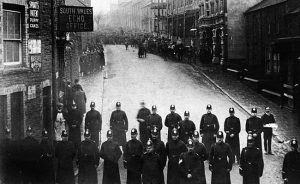
Finally, just last month came another outburst, reviving a “golden oldie” nursed by British socialists for over a century: that Churchill sent the army to kill strikers in the Rhondda Valley, Wales in 1910-11. The Guardian went right to work. “Do you consider Winston Churchill a hero or a villain?” they asked John McDonnell, the Labour Party shadow chancellor of the exchequer. “Villain,” Mr. McDonnell shot back: “Tonypandy.” A two-word gotcha! The Guardian then supplied an inaccurate rehash of the Tonypandy riots, where Churchill is supposed to have sent troops to attack strikers.
McDonnell was crushed under a massive reaction by press and public—a sign that the truth is winning. Ironically, back in the day, the same Guardian was defending Churchill for his moderation. (See “Churchill, Tonypandy and ‘Poundland Lenin.'”)
In 1965 the BBC interviewed surviving Welsh strikers, including Will Mainwaring, who had been one of the youngest militants in the South Wales coalfields. Half a century on, he still spoke with pride of championing the miners and of his record as a protestor. Of Churchill’s decision to send troops to the Rhondda in 1910 Mainwaring said:
We never thought that Winston Churchill had exceeded his natural responsibility as Home Secretary. The military did not commit one single act that allows the slightest resentment by the strikers. On the contrary, we regarded the military as having come in the form of friends to modify the otherwise ruthless attitude of the police forces.
Churchill’s Defenders Welcome Allies
For forty years, much of my work has been to defend Churchill’s good name from ignorance, some of it around for a century. It still circulates, but I’ve noticed how little now goes unchallenged.
Whenever a slander surfaces nowadays, the Hillsdale College Churchill Project is inundated with email asking us to proclaim the truth. And we’re not alone. Many sources—the Churchill Archives Centre, the various Churchill societies, academics, press and the public online, share the defense. This is an encouragement to us, to balanced biographers, and to anyone who wishes to understand the greatest Briton. The only thing worse than fighting with allies, as Churchill said, is fighting without them.
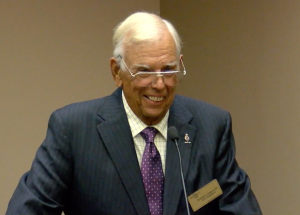







5 thoughts on “Current Churchill Contentions: “The Invasion of the Idiots””
I agree Reddit is notoriously far leftist (Holodomor denial is ramapant) and infested with Russian, Chinese and Iranian trolls who seek to sow discord, spread propaganda and indulge in whataboutism and lies.
Reddit at one point thought Churchill was worse than Hitler ! I jest but only slightly.
However [this](https://www.reddit.com/r/HistoryPorn/comments/bkjflm/a_21yearold_winston_churchill_as_cornet_of_the/) recent post is one such example of the changed scenario on Reddit.
The lies are down voted and the truth is up voted.
Things ARE changing on Reddit and I hope it stays this way.
As usual thank you and please keep up the great work !
Thanks, that’s most encouraging. My son, who monitors Reddit from Silicon Valley, says: “Reddit is mostly leftist snark, and anyone can say anything (though the site has its own comment etiquette), so there’s usually a lot of crap when Churchill things come up. Also note that Russian propaganda trolls are very present and active — I’ve seen troll posts about Brexit mentioning Churchill — but the Reddit community appears to be aware of them and attempts to deal with them. Usually, posts about Churchill appear under the forums (subreddits) /r/quotes, /r/HistoryPorn, and /r/TodayILearned”
Some links:
Churchill posts from the last month. (Ignore anything with less than 100 points.)
Posts linked to richardlangworth.com.
Someone is doing spadework for the truth—click here.
I agree the truth is winning. On Reddit until mid 2018, whenever Churchill was mentioned, people immediately accused him of genocide, mass murder and other nasty things. Now however the situation is different, slowly but surely Reddit is changing. People have read up on the matter and now put forth a strong case in defence of Churchill and skillfully combat such vicious lies. Your website is invaluable and has played no small part in aid of all this. I thank you, I hope it stays this way and please keep up the good work !
Well said. You’re signed up!
Many Labour people understood and admired Churchill. Clement Attlee was one: https://winstonchurchill.hillsdale.edu/clement-attlee/
“A man of his time” is not a sufficient defense. Repeatedly he resisted the racism of his time. See toward the end of this article:
https://winstonchurchill.hillsdale.edu/white-supremacy/
I definitely qualify as an ally to the side of the Good Guys and Sir Winston is one of the great Good Guys in history. My parents admired him, my aunts and uncles admired him, my godparents admired him, my grandparents admired him which is remarkable since they came out ofthe Red Clyde and leaned strongly Labour. In my experience, those with military experience in WWI and WWII had respected Churchill the man for his courage and for his military service in the front lines. We always have to remember Noah. God said he was a good man IN HIS GENERATION. We cannot expect WSC to be PC according to our lights. But upon the whole and it is upon the whole that such things must be judged British influence was and is a kindly influence. The influence of Sir Winston Churchill is a kindly and noble influence on us all. Besides being the great war leader he was one of the greatest and most prolific authors of the English language.
Comments are closed.